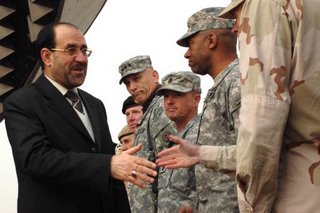Government Watchdog Offers Congress Iraq Oversight Suggestions

With Democrats in control of Congress and pressing more intensive oversight of U.S. involvement in Iraq, a government watchdog agency is offering members of Congress suggested lines of inquiry for that oversight.
The Government Accountability Office (GAO) packaged those recommendations in a new report titled, "Securing, Stabilizing, and Rebuilding Iraq Key Issues for Congressional Oversight."
GAO is the nonpartisan investigative arm of Congress.
"As the United States reviews its plans to secure, stabilize, and rebuild Iraq, I have enclosed a series of issue papers for consideration in developing your oversight agenda for the 110th Congress and analyzing the President’s revised strategy for Iraq," Comptroller General David Walker told key members of Congress in a letter. "These papers are based on the continuing work of the U.S. Government Accountability Office and the 67 Iraq-related reports and testimonies we have provided to the Congress since May 2003.
"Iraq has had three successful elections, adopted a constitution, and installed its first elected government. At the same time, since the initial ground offensive ended in 2003, the costs to secure and stabilize Iraq have grown substantially, as has the level of violence that afflicts Iraqi society," he added. "Such violence stems from an insurgency that has grown more complex and lethal over the past 3½ years and the Sunni-Shi’a conflict, which escalated dramatically in 2006. This instability complicates meaningful political reconciliation among Iraq’s religious and tribal groups, reduces the effectiveness of U.S. and Iraqi reconstruction and capacity-building efforts, and diminishes the hopes and expectations of an Iraqi people without adequate jobs, water, fuel, and electricity."
A few of the recommended oversight questions include:
• What is the desired end-state of U.S. involvement in Iraq? How long, and at what cost, will it take to achieve a peaceful, stable, and secure Iraq?
• What political and economic incentives are needed to increase security, improve government capacity, and reduce corruption in Iraq?
• How will revised U.S. plans incorporate enhanced support for Iraqi security forces and national and provincial governments?
President Bush ordered the invasion of Iraq because he said Iraq was developing weapons of mass destruction. No WMDs have been found. The war in Iraq has claimed more than 3,000 American lives.
President Bush last night outlined a "new strategy" for Iraq that involves deployment of additional troops -- a proposal most Americans disagree with.
Bookmark http://universeeverything.blogspot.com/ and drop back in sometime.


0 Comments:
Post a Comment
Subscribe to Post Comments [Atom]
<< Home